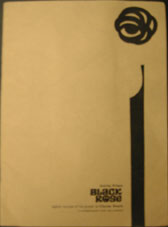An Indian Interlude
From his childhood when he read Kipling's Just so stories and others, Brasch had a lasting interest in India. Brasch heard Rabindra Nath Tagore (1861-1941) lecture twice, 'a square figure in a white robe, white-haired, with a long white beard.' Brasch read Tagore's songs in Bengali and thought the language remarkably close to Indian music. He came to love Indian music for its subtle quality and how it 'stole on the senses.' This limited edition of Tagore's Gitanjali has an introduction by Yeats, one of Brasch's favourite poets.
Khushwant Singh (1915- ) is perhaps India's most prolific author. He has written over 80 books, his most popular being the two-volume History of the Sikhs, Train to Pakistan, I Shall Not Hear the Nightingale, Delhi and The Company of Women. He was founder-editor of Yojana, before moving on as editor of The Illustrated Weekly of India, The National Herald and The Hindustan Times. He has often been derided by critics for 'sensationalism' and pandering to populism in his writings. Brasch obtained a number of Khushwant Singh's works, including this 'Four Square' paperback edition with its sixties cover.
The Cloth of Gold is a dance drama in verse and was published in 1951, by the publisher Charles E. Tuttle in Vermont, USA. M. Krishnamurti was a member of the Indian cultural delegation that visited New Zealand in 1962. This is a signed presentation copy: 'To Charles Brasch with a fellow-poet's greetings. M. Krishnamurti. Dunedin, 4 October 1962.'
'We made these versions as follows. I do not know Panjabi, and Amrita Pritam translated each poem for me literally, line by line. I then reshaped the lines gradually, reading successive versions over to her to make sure I had neither misread her meaning nor lost it. Where literal translation seemed impossible, she would read the poem and explain it while I made notes, afterwards turning the notes into lines as close to hers as I could get. I made further revisions later, always referring them to her, until I felt I could do no more.' This is Brasch's explanation of the translation process he was involved in with Amitra Pritam (1919- ), the well-known Punjabi poet and fiction writer. She has recently been awarded the prestigious Life Time Achievement award by the World Punjabi Congress.
 |
| Amitra Pritam, Black rose. Delhi: Nagmani, 1967. |
Next >